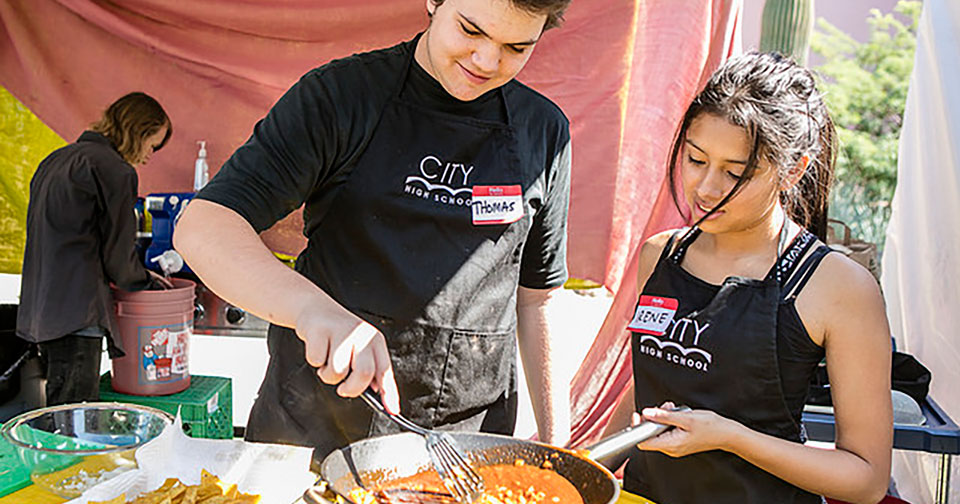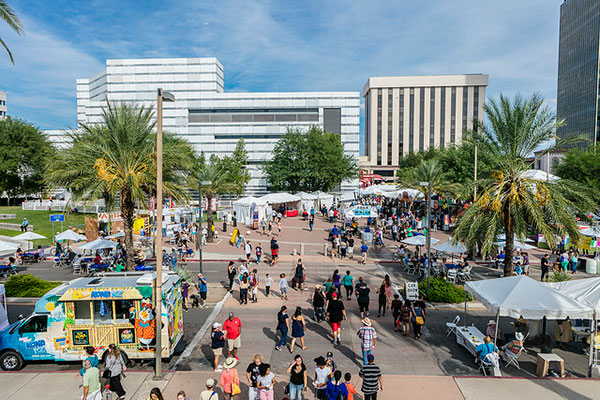
[pullquote]
What
43rd Annual Tucson Meet Yourself Festival
When
Oct. 7-9
Where
El Presidio Park
160 W. Alameda St.
More Info
tucsonmeetyourself.com
[/pullquote]
What do you get when you put a significant designation by UNESCO in the middle of a folklife festival?
You get The City of Gastronomy Kitchen Stadium, an entire arena—complete with bleachers and live performance—making the intersections of food and culture visible… and taste-able.
The City of Gastronomy Kitchen Stadium is a special offering at this weekend’s 43rd annual Tucson Meet Yourself, a festival sharing our city’s many cultural expressions through food, dance, song, folk arts, and more. The Kitchen Stadium aims to share, through a multi-sensory experience, some of the reasons Tucson earned the designation from UNESCO, said Liane Hernandez, the Kitchen Stadium coordinator.
Tucson Meet Yourself is one those reasons, says Maribel Alvarez, a folklorist and the executive director of the festival along with its parent-producing organization, the Southwest Folklife Alliance.
“TMY has offered the public a space for understanding heritage foods and foodways long before those terms became trendy,” Alvarez says.
Many people call the festival “Tucson Eat Yourself” because the multitude of food booths offering culinary creations from many regions of the world. (This year nearly 60 vendors will participate.)
But Alvarez says, “Tucson Meet Yourself is actually the ultimate anti-food event. The festival features the other side of the trendiness of food: the working class, make-do spirit of home cooks and church potlucks.”
View the official list of Tucson Meet Yourself 2016 food vendors
The City of Gastronomy Kitchen Stadium celebrates that spirit. It is an augmentation of past TMY’s “culture kitchens,” which featured food demonstrations on a smaller scale and only at certain times. The Kitchen Stadium moves to the center of the festival and offers conversations, demonstrations, recipe sharing, and food tastings all day for all three days, Hernandez says.
Hernandez worked with Tana Fryer, owner of Blu – A Wine and Cheese Shop, to reach out to farmers, food enthusiasts, activists, students and others in the region to participate. “Our goal is to show the larger story of food and food production versus what you get in the grocery store, which is decontextualized.”

A trained chef, Hernandez is interested in what defines a distinct Tucson “cuisine.” Part of that cuisine, she believes, celebrates the local and native desert flavors. Several local food producers will be featured in the CoG Kitchen Stadium.
Ema Peterson of Beer Geek Bakery is a young entrepreneur using local beers in her baked goods. She’ll share the tent with John Adkisson of Iron John’s Brewing, who has used mesquite flour, green chiles, and creosote flowers in some of his brews.
Another conversation will highlight local “coffee culture,” featuring Amy Rude-Smith of Exo Roast, Anna Perreira of Yellow Brick, and Eli Schneider of Bentley’s. Local cheese and wine makers as well as members of San Xavier Cooperative Farm will also share their traditions and practices.
Download Tucson Meet Yourself 2016 food vendor map (PDF)
“We also wanted to tell the story about food producers and advocates who are working to make more sustainable food, accessibility and justice part of the tale of food in Tucson,” Hernandez said.
The activist groups Flowers and Bullets and Tierra y Libertad will speak about neighborhood organizing and backyard gardening, sharing ways to improve access to healthy food for low-income households.
The Pima Community College Culinary program is providing the basic mobile kitchen, and every evening students from that program will be featured. “We’ll get to hear from Tucson’s next generation of chefs,” Hernandez says.
Additional conversations and presentations will address gardening, agriculture, health and nutrition, ethnobotany, cooperatives, and more, Hernandez says.
This is the kind of information festival-goers are hungry for, Alvarez says. In on-site surveys conducted over the past three years at TMY, 65% of attendees say the event’s “educational” purpose is what they most enjoy.
Accompanying the Kitchen Stadium will be the City of Gastronomy Exhibit, offering visual displays and information about the many creative food initiatives that earned Tucson the UNESCO designation. The exhibit produced in partnership with the City of Tucson and UA/College of Social and Behavioral Sciences and Center for Regional Food Studies.
“Tucson is somewhat of an enigma to people outside the area when it comes to its reputation for food,” said Dena Cowan, curator of the exhibit. “The first image conjured up by the UNESCO honor is one of a city with dozens of five-star restaurants. While we do have some excellent chefs and top-notch eating establishments, the real strength of our food system is found behind the scenes in water harvesting, arid lands crops, conservation, food journalism, innovation, micro-enterprises, diversity and food justice.”